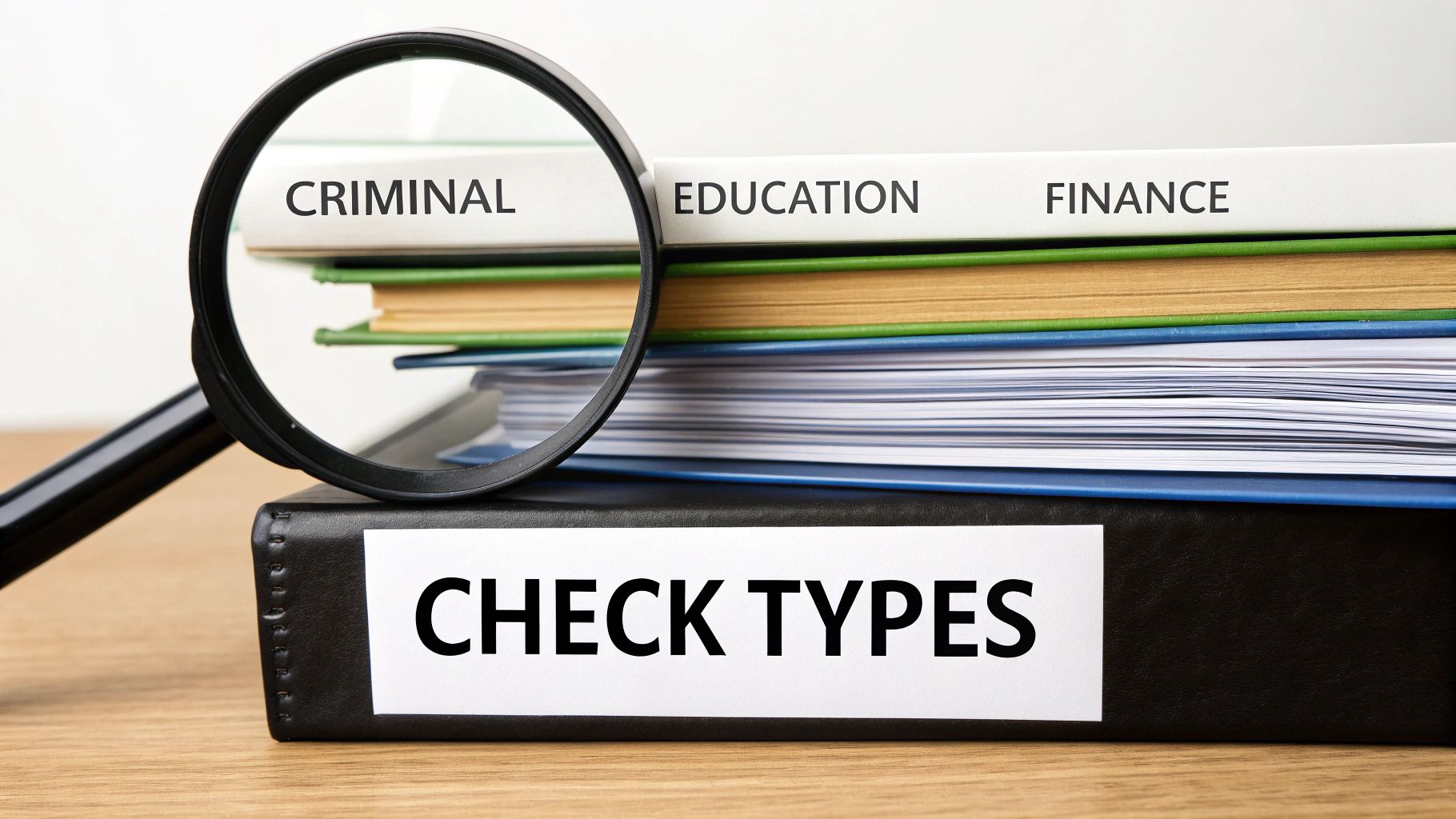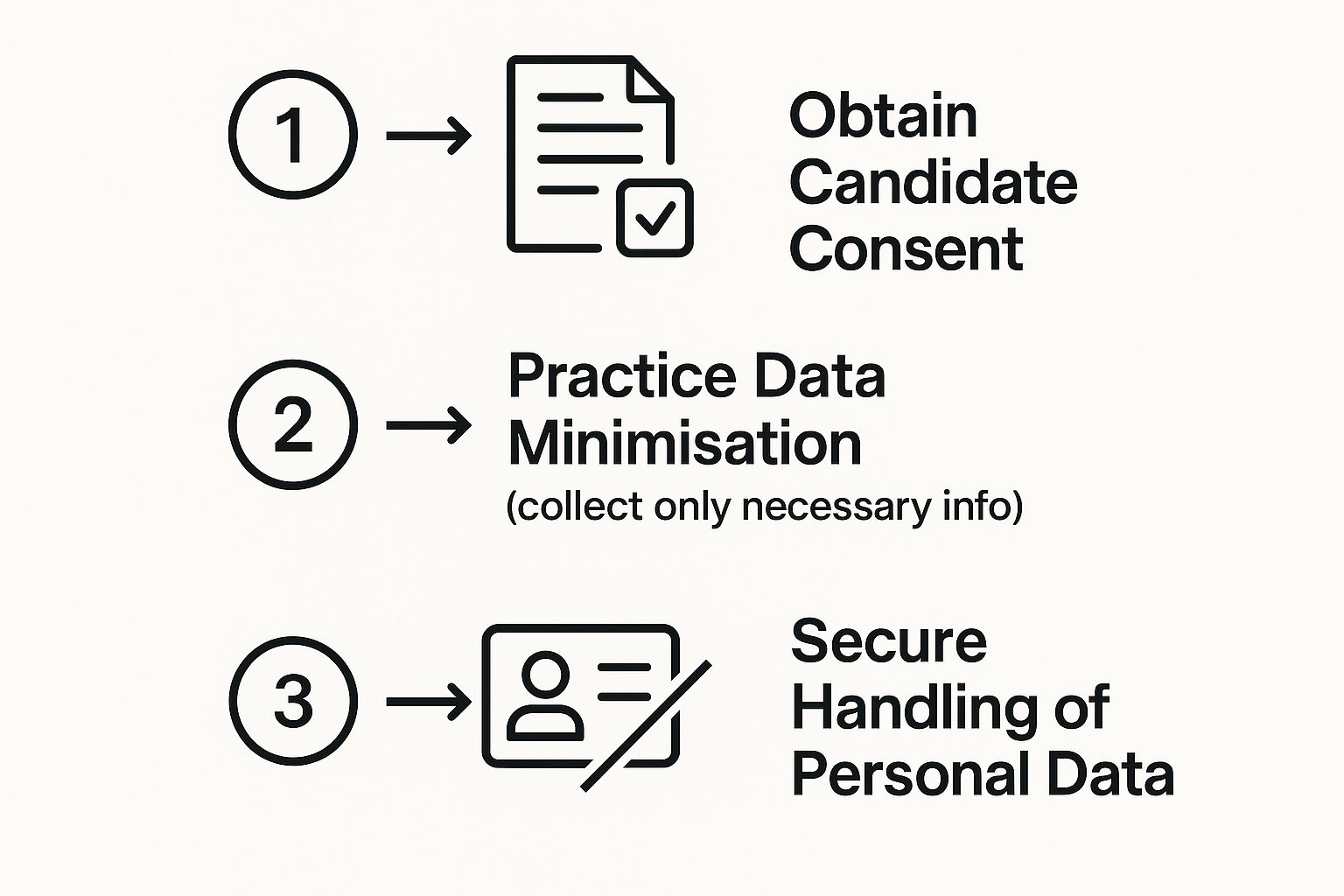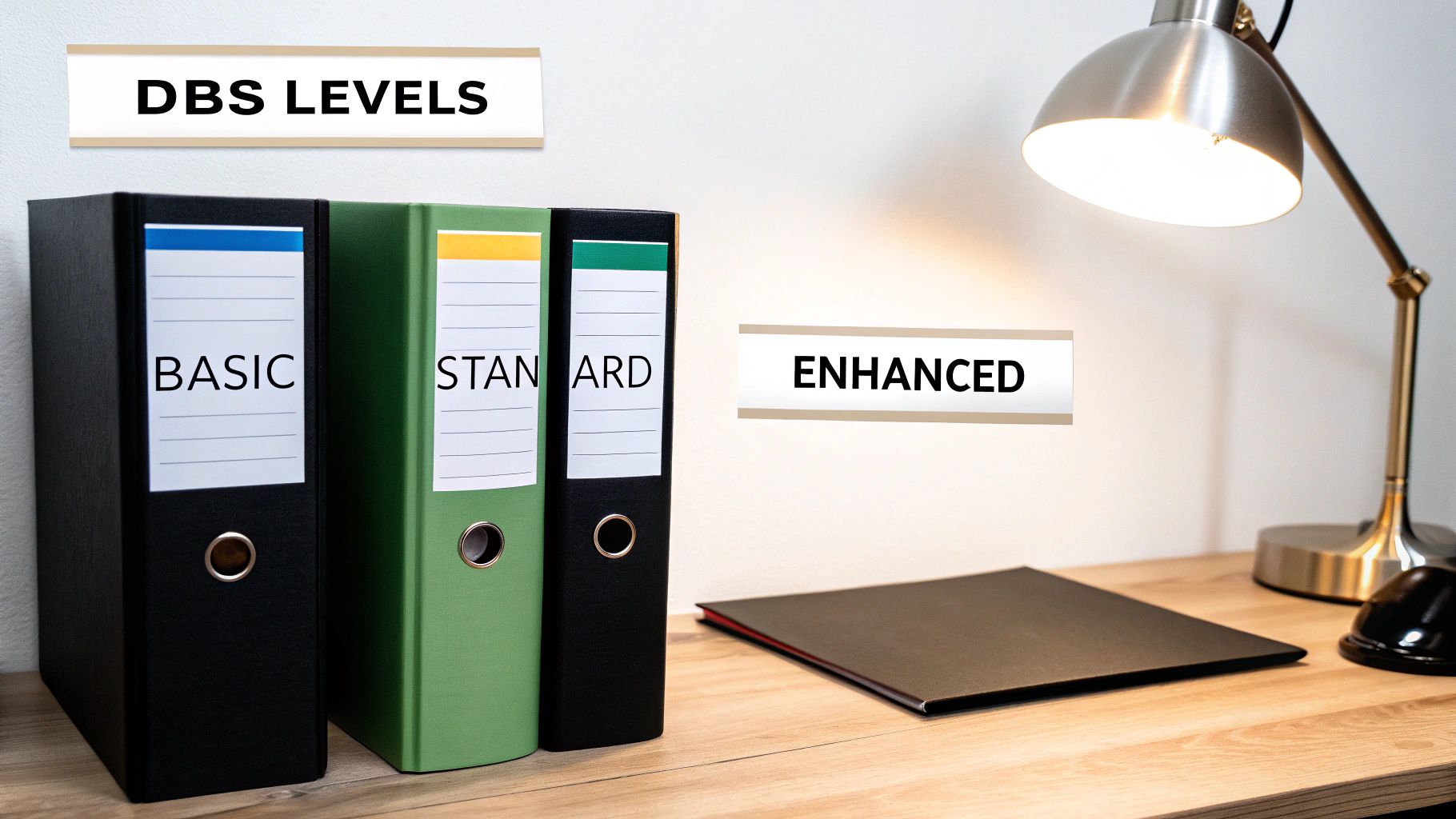A background check is, at its core, a way for an individual or a business to confirm that someone is exactly who they say they are. It’s a chance to look at their past—criminal records, education, employment history, and more—to make sure everything lines up.
What a Background Check Really Means for Your Business

When you hire a new employee, you’re not just filling an empty seat. You’re making a serious investment in your company’s culture, its security, and its future. Think of a professional background check as the essential due diligence that protects that investment. It takes you far beyond the words on a CV, turning into a critical risk management tool for any modern UK business.
Ultimately, the goal of a background check is to build trust from the ground up. It’s a proactive step to confirm a candidate’s qualifications are genuine, protect your workplace from potential harm, and defend your company’s reputation and assets.
Protecting Your Organisation Proactively
Think of pre-employment screening as a vital security measure for your entire team. By taking the time to confirm the details a candidate provides, you start to manage risk right from day one. This simple act of verification helps to head off serious problems down the line, such as internal fraud, theft, or the damage caused when someone has misrepresented themselves. It’s all about building a reliable and secure team.
Here in the UK, the need for this kind of diligence is stark. The CIFAS Fraudscape 2025 report revealed that over 217,000 cases of fraud were reported in just the first half of 2025, a figure that underscores the real risks businesses face every day. You can find out more by reading our detailed explanation of due diligence.
Key Objectives of a Professional Background Check
A properly executed background check isn’t a hunt for negative information. It’s a structured process designed to achieve several key business objectives that create a safer and more productive workplace.
A background check is less about uncovering secrets and more about confirming truths. It ensures that the person you’re bringing into your organisation has a history that aligns with the trust and responsibility the role requires.
The following table outlines the main goals employers look to achieve through pre-employment screening.
| Objective | Description |
|---|---|
| Verify Identity & Credentials | Confirms that candidates are who they say they are and genuinely hold the qualifications and experience they claim. |
| Ensure Workplace Safety | Identifies individuals with a history of behaviour that could pose a risk to colleagues, customers, or company property. |
| Safeguard Company Assets | Reduces the risk of financial loss through theft, fraud, or other forms of dishonest behaviour. |
| Maintain Regulatory Compliance | Helps meet legal and industry-specific hiring requirements, especially in regulated sectors like finance, healthcare, and education. |
By focusing on these objectives, a background check becomes an invaluable part of a smart, responsible hiring strategy.
What Do Background Checks Actually Look For?

When people talk about a “background check,” they often picture a single, all-seeing search. The reality is quite different. Think of it more like a specialist’s toolkit – you don’t use every tool for every job. Instead, a professional check is a series of specific searches, carefully selected to match the responsibilities of the role in question.
This tailored approach is crucial for running an effective and fair screening process. You wouldn’t need a deep dive into the financial history of a junior graphic designer, but you certainly wouldn’t skip a criminal record check for someone working with vulnerable children. It’s all about proportionality and relevance.
Criminal Record (DBS) Checks
This is probably the most familiar type of check. A Disclosure and Barring Service (DBS) check delves into an individual’s criminal history, and it’s absolutely vital for any role built on trust, security, or involving contact with vulnerable people. The depth of the check varies, from a Basic overview to a far more detailed Enhanced check.
It’s a critical part of managing risk. For instance, while recorded victim-based crime in England and Wales fell by 2% to roughly 4.5 million in the year to March 2025, the rate of charges for these offences has actually gone up, especially for theft. These official UK crime statistics from GOV.UK show exactly why verifying a person’s history remains a non-negotiable step.
Employment and Education Verification
Think of this as the fundamental fact-checking stage. These checks simply confirm that what a candidate has put on their CV is true. An investigator will reach out to their previous employers and educational institutions to verify dates of employment, job titles, and the qualifications they claim to have earned.
It’s less about uncovering hidden problems and more about confirming the facts. This process ensures the person you’re considering has the genuine experience and credentials to do the job well, protecting your organisation from misrepresentation.
Financial History and Right to Work Checks
For some positions, particularly in the financial sector or roles with major budget responsibility, a financial history check is essential. This search can bring to light things like County Court Judgements (CCJs), credit history issues, or insolvency records. It isn’t about judging personal wealth; it’s about gauging a person’s reliability and assessing the risk of placing them in control of company funds.
Separately, a Right to Work check is a legal must-have for every single employer in the UK. This is a straightforward verification to confirm a potential employee is legally permitted to work here. Getting this wrong can lead to significant fines and serious legal trouble for your business.
These different components show how a background check is built, piece by piece, to create a relevant picture. This isn’t just for hiring, either. The same principles apply when vetting potential tenants. Landlords can explore the specifics of tenant background checks in our comprehensive guide. By assembling the right package of checks, you get the information you need without crossing any legal or ethical lines.
Staying Compliant with UK Data Protection Laws
Navigating the legal side of any background check isn’t just good practice; it’s a legal minefield if you get it wrong. Think of data protection laws as the essential rulebook for handling someone’s personal information. A misstep here can lead to eye-watering fines and do serious damage to your company’s reputation.
In the UK, the two heavyweights you absolutely must understand are the General Data Protection Regulation (GDPR) and the Data Protection Act 2018. These aren’t just bureaucratic red tape; they’re designed to protect an individual’s privacy and give them real control over their personal data. For any employer, this means every single step of your screening process has to be fair, transparent, and legally watertight.
Your Core Legal Obligations
The moment you decide to run a background check, you take on the role of a “data controller.” It’s a formal title that comes with serious responsibilities, not just suggestions. These are legally enforceable duties designed to protect the candidate.
Crucially, you must have a lawful basis for processing someone’s data. When it comes to pre-employment screening, this almost always boils down to getting explicit and informed consent from the candidate before you even think about starting. This can’t be a vague clause buried in the small print of an employment contract; it has to be freely given, specific, and crystal clear.
A candidate’s personal data is not a public resource; it’s a private asset you’ve been temporarily entrusted with. Your legal duty is to act as a responsible custodian, handling it with the same care and security you would your own company’s most sensitive information.
The legal framework here is fundamentally shaped by GDPR. As we move towards 2025, the expectation is that businesses will double down on data privacy, making sure all their background check processes are fully compliant by investing in secure systems and tight access controls.
This infographic breaks down the basic, compliant flow for handling data during a background check.

As you can see, consent is the non-negotiable first step, followed by careful data collection and secure management. To get a real grip on these regulatory requirements, this detailed GDPR compliance checklist is an invaluable resource.
Data Minimisation and Security
Another core GDPR principle you need to live by is data minimisation. In simple terms, it means only collecting what is strictly necessary for the job in question. For instance, running an invasive financial history check on someone applying for a warehouse operative role would almost certainly be seen as excessive and non-compliant.
Once you have the necessary information, you’re legally obligated to protect it. This isn’t optional. It involves:
- Secure Storage: Keeping the data in a protected environment, whether it’s a locked filing cabinet or an encrypted digital folder.
- Access Control: Strictly limiting who inside your organisation can actually see this sensitive information.
- Retention Policies: Having clear, documented rules for how long you’ll hold onto the data and how you’ll securely destroy it when it’s no longer needed.
For a deeper dive, our articles offer more practical advice on maintaining during any investigation. Ultimately, following these rules isn’t just about dodging penalties. It’s about building a foundation of trust with potential and current employees from day one.
How to Run a Compliant Background Check
Running a professional background check isn’t just a quick online search; it’s a meticulous process. To get it right, you need a clear, repeatable roadmap that ensures every check is effective, fair, and above all, legal.
Following a proper structure protects your business from serious legal headaches and shows respect for the candidate’s privacy. It creates a transparent and professional experience for everyone involved from day one. Think of it like a builder laying a foundation—get it wrong, and everything built on top is at risk. A well-organised process ensures you gather only the information you truly need, without falling foul of data protection laws or letting bias creep into your decisions.
Step 1: Define the Scope of the Check
First things first: you need to decide which checks are actually necessary. A scattergun, one-size-fits-all approach simply won’t do and isn’t compliant with UK law. The checks you run must be directly relevant to the specific duties and responsibilities of the role you’re filling.
For instance, running a credit history check makes perfect sense for someone in a senior finance role with significant financial authority. But for a graphic designer? It’s completely inappropriate. Likewise, an Enhanced DBS check is crucial for roles involving work with children or vulnerable adults but would be excessive for a standard office administrator.
Step 2: Get Explicit Written Consent
This step is absolutely critical and a non-negotiable legal requirement under GDPR. Before you do anything else, you must get clear, written consent from the candidate.
This consent needs to be:
- Informed: The candidate must know exactly what you’ll be checking and why you need to.
- Specific: Consent must be for the background check itself, not buried in the small print of a general employment contract.
- Freely Given: The candidate must have the genuine choice to refuse, even if you explain that refusing means their application cannot proceed.
Obtaining consent isn’t just a box-ticking exercise; it’s the cornerstone of a lawful and ethical screening process. It establishes a foundation of transparency and respect from the very beginning of your professional relationship with a candidate.
Step 3: Choose a Reputable Screening Provider
While it’s possible to conduct some basic checks yourself, partnering with a professional screening provider is almost always the smarter, more reliable choice. A reputable agency guarantees that all searches are handled legally and that the information they provide is accurate and current.
These experts know how to navigate complex databases and tricky legal frameworks, which saves you a huge amount of time and significantly reduces the risk of making a costly compliance error. If you’re curious about the mechanics behind it all, you can read our detailed guide explaining how background checks work.
Step 4: Gather Documents and Interpret the Report
Once you have consent, the next stage is gathering the necessary documents from the candidate, such as proof of identity and address. After the checks have been run, you’ll receive a final report.
This is where careful, objective judgement comes in. It’s crucial to look at any information uncovered purely in the context of the job role. A minor driving offence from ten years ago is hardly relevant for an accountant’s position. Your final decision must be fair, consistent, and based solely on the genuine requirements of the job to ensure you avoid any form of discrimination.
Choosing the Right DBS Check for Your Role

For a huge number of UK employers, particularly in fields where safety and trust are paramount, the Disclosure and Barring Service (DBS) check is the cornerstone of any thorough background screening. But it’s not a one-size-fits-all solution. Think of it as a tiered system, carefully designed to provide the right amount of information for the specific role you’re hiring for.
Picking the wrong level isn’t just a bit of admin hassle; it can lead to serious compliance issues. Getting to grips with the difference between a Basic, Standard, and Enhanced check is non-negotiable for anyone involved in hiring. It’s about getting the insight you need without crossing legal lines.
The Three Tiers of DBS Checks
Each level of a DBS check peels back a different layer of an individual’s criminal record history. The law is very clear on which check you can request—it all comes down to the job description and the responsibilities that come with it.
- Basic DBS Check: This is the entry-level check, and you can ask for it for any position. It will show you any ‘unspent’ convictions and conditional cautions, providing a solid baseline of a candidate’s recent record.
- Standard DBS Check: Stepping up a level, this check is reserved for specific roles defined in law, like those in finance or law. It discloses both spent and unspent convictions, as well as cautions, reprimands, and final warnings.
- Enhanced DBS Check: This is the most comprehensive check available. It’s strictly for roles that involve working closely with children or vulnerable adults. It includes everything in the Standard check, plus any relevant information held by local police that they believe is pertinent to the role.
The guiding principle is straightforward: the more responsibility the role holds, especially around vulnerable groups, the deeper the check needs to be. It’s all about matching the level of scrutiny to the level of risk.
To make this easier to digest, here’s a breakdown of what each check involves and where it’s typically used.
Comparison of UK DBS Check Levels
| DBS Check Level | What It Discloses | Commonly Used For |
|---|---|---|
| Basic | Unspent convictions and conditional cautions. | Office staff, retail workers, hospitality roles. |
| Standard | Spent and unspent convictions, cautions, reprimands, and warnings. | Financial services, legal professionals, security guards. |
| Enhanced | All information from a Standard check, plus relevant local police intelligence. | Teachers, healthcare workers, care home staff, social workers. |
This table clearly shows how the scope of each check widens based on the sensitivity of the role in question.
Maintaining Clearance with the DBS Update Service
For positions requiring continuous monitoring, the DBS Update Service is a fantastic resource. It’s an online subscription service that lets employers check the status of an existing DBS certificate, as long as they have the applicant’s consent.
Essentially, it means you don’t have to go through the whole process of applying for a new check every year. A quick, free, online status check will tell you if any new information has come to light since the certificate was issued. This is a huge time-saver and makes keeping your safeguarding obligations current much more manageable.
Common Questions About UK Background Checks
It’s one thing to understand the theory, but how does a background check actually play out in the real world? It’s natural for both employers and candidates to have questions. Getting straight answers helps make the whole process feel less mysterious and ensures everyone knows where they stand.
Let’s tackle some of the most common queries we hear, giving you the practical information you need to move forward with confidence.
How Long Does a Background Check Take in the UK?
This is usually the first question on everyone’s mind, and the honest answer is: it depends. The timeline for a background check isn’t fixed because it hinges entirely on what you’re looking for.
A Basic DBS check, for instance, can often be turned around in just a few days. But when you need to dig deeper, the clock starts to tick a bit slower.
- Standard and Enhanced DBS Checks: Because these involve checks with multiple agencies, you should realistically expect them to take between two and four weeks.
- International Verifications: If a candidate has lived, worked, or studied abroad, verifying that information can naturally extend the timeline.
Smart hiring managers always build this into their recruitment schedule. Factoring in a buffer for the screening process from the start prevents last-minute panics and keeps the onboarding process running smoothly.
Can a Candidate Refuse a Background Check?
In short, yes. A candidate has every right to say no. The entire system, especially under GDPR, is built on the foundation of explicit consent. No one can run a background check on you without your permission.
But that refusal has consequences. If the check is a stated, necessary part of the hiring process for that role, the employer can legally withdraw the job offer. For any position where security, trust, or regulatory compliance is important, refusing a check will almost certainly bring the application to a halt.
What Happens If Adverse Information Is Found?
Finding something unexpected doesn’t automatically mean the candidate is out of the running. UK employers have a legal duty to handle these situations fairly, taking a step back to look at the bigger picture before making any rash decisions.
It’s all about context. The seriousness of the information, how long ago it happened, and whether it has any real bearing on the job are all crucial factors. A minor driving offence from a decade ago, for example, is hardly relevant for someone applying for an accounting role.
Under the Rehabilitation of Offenders Act 1974, it is illegal for employers to discriminate against a candidate based on ‘spent’ convictions for the vast majority of roles. This legislation ensures that past mistakes do not unfairly hinder future employment opportunities.
Good practice is to open up a conversation with the candidate about the findings. This gives them a chance to explain the circumstances, providing you with the full story and ensuring you can make a fair, balanced assessment. For more detailed answers to specific scenarios, have a look at our comprehensive background check FAQ section.
Who Is Responsible for Paying for a Background Check?
In almost every case, the employer foots the bill. The cost of a background check is simply seen as a normal part of the recruitment budget—an investment in due diligence.
While it’s not technically illegal to ask a candidate to pay for their own DBS check, it’s extremely rare and generally frowned upon. It can leave a sour taste and might even put off great candidates. When it comes to all other checks, like verifying employment or education, the cost is almost always covered by the company doing the hiring.
At UK Private Investigators, we provide discreet, professional, and fully compliant background check services to give you the clarity and confidence needed to make informed decisions. Protect your business and build a trustworthy team with our expert screening solutions.

